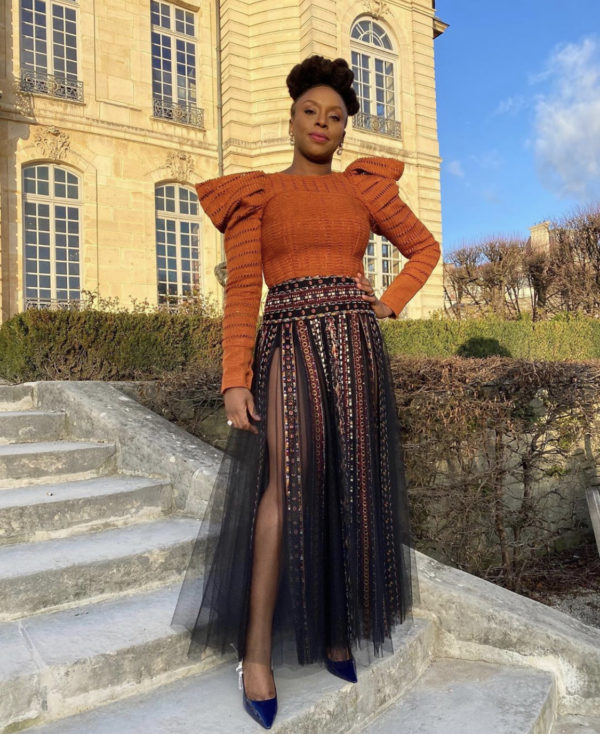
In a recent interview with Tofarati Ige and Mobola Sadiq of Punch, Chimamanda Adichie discusses writing, the stereotypes attached to feminism, her favorite cities in the world, food, her favorite musicians, and more.
***
On the question of African literature not been as sophisticated as their Western counterparts:
“That is rubbish. What is the definition of sophistication? The unfortunate thing about being from formerly colonised countries, as we Africans are, is that we sometimes struggle to give ourselves the value we deserve. And we think everything western is automatically better. Good literature can come from anywhere. There are examples of African literature that are exceptional, just as there are examples of western literature that are exceptional. The reverse is also true.”
On the (tired) question: should feminists get married?
“…..Of course, feminists should get married if they choose to. Feminism is about giving women choices. So, the idea of feminism is that we should not judge a woman who chooses not to get married; we should not pressure young women to get married when they are not ready to; we should not teach young women that marriage is an achievement. But at the same time, we should keep in mind that love is a wonderful thing, and that marriage can be a source of joy and fulfilment, but can also be a source of oppression if you marry the wrong person.”
On her favorite musicians right now:
“Falana is multi-talented and original. Yemi Alade, Waje and Omawumi all have fantastic vocal power and a beautiful artistic aura that is hard to imitate. Teni is so refreshing and gifted. Asa is a goddess. I think Phyno is extremely talented, and there is a unique and edgy quality in his ability to bridge modern high life and rap. Flavour’s music has a lovely nostalgic quality that is contemporary but has its roots in the past. There are songs by D’Banj, 2baba, P-Square and 9ice that I consider modern classics. Burna Boy is interesting because he seems keen to create an unorthodox body of work. Umu Obiligbo is my most recent discovery and I love their song, Culture. But as far as eternal favourites go, I always return to the queen, Onyeka Onwenu; the inimitable Fela Anikulapo-Kuti; and Celestine Ukwu, who I consider a philosopher-musician.”
On the rigors of travel and managing her creative space:
“Travel can be stressful but I love meeting my readers. Travel also opens one up to new experiences. However, I actually accept only about five per cent of the invitations I receive, because I need to protect my creative time, so in a sense my travel is limited. In general, I plan all my trips so that I am not away from my family for more than three nights in a row.”
On the recent agitations for a separate sovereign state of Biafra:
“The reasons behind the agitations are valid – the sense of political exclusion that Igbo people have felt in its different permutations since the end of the Nigeria-Biafra war. I think dissent should be allowed in any democracy. Dissent is not treason. People were murdered during Operation Python Dance. The Nigerian government, by murdering people who were merely expressing dissent, has blood on its hands. However, I don’t think the agitators’ solution – a separate Biafran state – is viable. Where would the borders be? If you study the state of Biafra from 1967 to 1970, the borders were already contested, and there was discontent among the non-Igbo minority groups. I think what Nigeria desperately needs now is a restructuring. We need a real, practical and workable federalism. I also think the rise in Biafran agitation says something about the failure of Igbo political leadership as a whole. There are one or two exceptions, such as Peter Obi, who is an admirable leader, but in the main, there is a big and hollow void in Igbo political leadership, which has meant that the valid concerns of Igbo people, especially the youth, have come to be expressed in the form of an extreme Igbo nationalism.”
On her favorite vacation city:
“The one place where I feel very rested is my hometown, Abba, in Anambra State. I like to go to the village and eat too much and sleep too much. London is also one of my favourite cities in the world. I think it is a truly international city, in a way that New York isn’t, at least before Brexit. Other cities I’ve found very interesting are Rio in Brazil, Colombo in Sri Lanka and Porto in Portugal.”
On her favorite Nigerian food:
“Okpa. For those who are unfamiliar with the exquisite wonder of this dish, let me explain— it is like moin-moin but better. The okpa beans – some claim it is Bambara nut, but I am uninterested in this need we have of thinking our things are valid only when we call it by their English names. So you will never hear me say that something is the ‘African apple’ as some call udala; I simply call it udala. Anyway, the legume called okpa, is ground to a fine flour, sifted, and then mixed with palm oil, salt and pepper, wrapped in leaves and steam-cooked. It is quite a simple process but results in a wonderfully textured dish, bright yellow, dotted with red flecks of pepper. It is a traditional food of northern Igboland, present-day Enugu State, and because I am from southern Igboland, we didn’t eat it in our home. But we bought it on the way to the village, at Ninth Mile corner, and one of the enduring memories of my childhood was stopping to buy okpa, and waiting for when we got to the village, so we could cut the okpa into spicy yellow slices that we would slide into our mouths. I’m still looking for authentic Enugu state okpa in Lagos.”
Read the full interview here.
********
Photo by Chimamanda Adichie via Instagram.









COMMENTS -
Reader Interactions